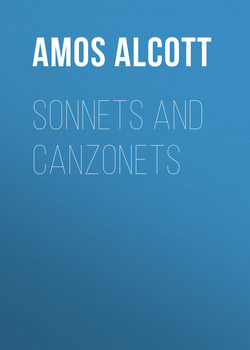Sonnets and Canzonets

Реклама. ООО «ЛитРес», ИНН: 7719571260.
Оглавление
Alcott Amos Bronson. Sonnets and Canzonets
TO A. BRONSON ALCOTT,
AN ESSAY
SONNETS AND CANZONETS
PART I. PROEM
PART II. SONNETS
Отрывок из книги
“Scorn not the sonnet,” said Wordsworth, and then gave us at least fifty noble reasons why we should not, – for so many at least of his innumerable sonnets are above languor and indifference, and all of them above contempt. Milton was more self-restrained than Wordsworth, and wrote fewer sonnets, every one of which is a treasure, either for beauty of verse, nobility of thought, happy portraiture of persons, or quaint and savage humor, – like that on “Tetrachordon,” and the elongated sonnet in which he denounces the Presbyterians, and tells them to their face, “New Presbyter is but old Priest writ large.” Shakespeare unlocked his heart with sonnets in another key than Milton’s, – less conformed to the model of the Italian sonnet, but more in keeping with English verse, of which Shakespeare had the entire range. His sonnets are but quatrains following each other by threes, with a resounding couplet binding them together in one sheaf, and his example has made this form of the sonnet legitimate for all who write English verse, – no matter what the studious or the pedantic may say. Surrey also, who first used the sonnet in English, wrote it in this free manner of Shakespeare, as well as in the somewhat stricter form that Sidney employed, and it is only of late years that they have tried to shut us up to one definite and unchanging sequence and interplay of rhyme. Mr. Alcott in these new sonnets, the ripe fruit of an aged tree, has used the freedom that nature gave him, and years allow: he has written with little uniformity in the order and number of his rhymes, but with much regard to the spirit of the sonnet as a high form of verse. I fancy that Dante (who may be called the father of the sonnet, though not the first to write it) chose this graceful and courteous verse, because it is so well suited to themes of love and friendship. When he would express sorrow or anger, or light and jesting humor, he had recourse to the canzonet, the terza rima, or what he called the ballad, – something quite unlike what we know by that name. Mr. Alcott has followed in the same general course; his sonnets are one thing, his canzonets another: though the difference in feeling, which prompts him to use one form rather than the other, cannot always be definitely expressed. It is felt rather than seen, and seen rather by the effect of the finished poem than by the light of any rule or formal definition.
Definiteness, in fact, must not be looked for in these poems; nor is it the characteristic of the highest poetry in any language. Verse may be powerful and suggestive, or even clear in the sense of producing a distinct impression on the mind, without being definite, and responding to all the claims of analysis. I take it that few readers will fail to see the central thought, or the vivid portraiture in each of these sonnets and canzonets; but fewer still will be able to explain precisely, even to their own minds, what each suggestive phrase and period includes and excludes in its meaning. For this fine vagueness of utterance, the sonnet has always given poets a fair field, and our present author has not gone beyond his due privilege in this respect, though he has availed himself of it more frequently than many would have done. The mottoes and citations accompanying each sonnet may help the reader to a meaning that does not at once flash in his eyes. But he must not expect to conquer these verses at a single reading. The thought of years, the labor of months, has been given to the writing of them; and the reader ought not to complain if he take as much time to comprehend them as the author took to write them. They are worth the pains of reading many times over, and even of learning them by heart, for which their compendious form well fits them.
.....
addressed his own cor gentil: —
In the same Italian vein, another and better poet, but with less warmth, touches the same theme, —
.....